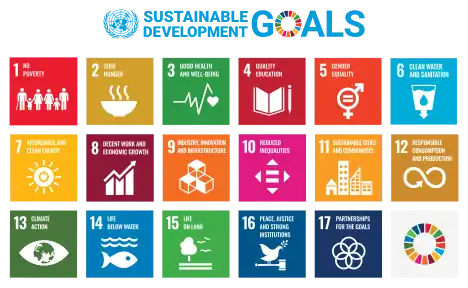Sustainable Development Goals
The Sustainable Development Goals (SDGs) are created by the United Nations and promoted as the Global Goals for Sustainable Development. They replaced the Millennium Development Goals that expired at the end of 2015. The SDGs run from 2015 to 2030. There are 17 goals and 169 specific targets for those goals.[1]
Goals

The Sustainable Development Goals, adopted on 25 September 2015 as a part of the 2030 Agenda.
In August of 2015, 193 countries agreed to the following 17 goals:[2]
- No poverty
- Zero hunger
- Good health and wellbeing
- Quality education
- Gender equality
- Clean water and sanitation
- Affordable and clean energy
- Decent work and economic growth
- Industry, innovation and infrastructure
- Reduce inequality
- Sustainable cities and communities
- Responsible consumption and production
- Climate action
- Life below water
- Life on land
- Peace and justice. Strong institutions
- Partnerships for the goals
References
- "Technical report by the Bureau of the United Nation's Statistical Commission (UNSC) on the process of the development of an indicator framework for the goals and targets of the post-2015 development agenda - working draft" (PDF). March 2015. Archived from the original (PDF) on 3 March 2016. Retrieved 1 May 2015.
- "The Global Goals For Sustainable Development". Global Goals. Retrieved 2 September 2015.
This article is issued from Wikipedia. The text is licensed under Creative Commons - Attribution - Sharealike. Additional terms may apply for the media files.